Our Vision is to foster well-balanced,
dynamic, and holistically empowered
individuals.
The Department of English was
established in 1962; English has been
offered as a first language since then, but
from 2020-21, English is being offered as a
second language under the National Education
Policy. In 2020, the National Education
Policy four-year multi-disciplinary
Bachelor’s programme with exit options was
introduced.
Under the four-year programme proposed in
the new N.E.P., students can exit after one
year with a certificate, two years with a
diploma, and three years with a bachelor’s
degree. Finally, after four years, a student
should be able to enter a research degree
programme.
English is the language of opportunities and
the window to the world.
-
The
Department has been at the forefront of
engaging, involving the outside world,
and bringing it inside the classroom.
The classroom is a forum for interaction
with faculty members who encourage the
students to question, analyze,
criticize, and contemplate a topic. It
aims to help students be empathetic to
the world outside the classroom. It
encourages the students to differ and
deviate from the popular view.
-
The
fundamental belief is that all students
can learn and improve their competence.
The faculty can guide a large section of
the student community.
-
The
Department of English takes pride in
encouraging its students to move beyond
the syllabus. With this in mind, the
Department arranges a parallel pedagogic
process of talks, lectures, seminars,
film shows and interactive sessions with
writers and critics.
-
The
teachers hone communication skills,
encourage the habit of reading books,
develop a passion for language and
literature, and guide young minds to
imbibe human values and a sense of
social and moral responsibilities.
-
Films are
screened to create awareness of social
issues, gender discrimination and other
evils.
-
The Film
Club and Women Redressal Cell are
closely associated with the Department.
Faculty profile
|
Name |
Qualification |
Designation |
Specialization |
Experience
(Years) |
|
B.C.Vinutha |
M.A. HoD |
Associate Professor and HoD |
American Literature
European Classics |
32 |
|
C.M.S. Lokeshwaraiah |
M. A., B.Ed., M.Phil. |
Associate Professor |
Images in the plays of W.H. Auden
Linguistics/Shakespeare |
32 |
|
Dr G.N.Umesh |
M.A, M.Phil.,
Ph.D. |
Associate Professor |
Modern English Grammar Spoken and
Communicative English |
32 |
|
Lakshmi |
M.A. |
Guest Faculty |
|
2 |
-
Teachers
present papers at national/international
seminars and symposia. They regularly
contribute research articles to
well-known journals.
-
There is a
good collection of books in the
departmental library. The Department has
grown significantly over the years and
adapted well to the changing times.
Faculty acknowledges that good work can
have enormous rewards and make teaching
and learning more relevant to society.
-
Dr G.N.
Umesh received the Dr Radhakrishna
Shikshana Rathna National Award for
excellent teaching and publications in
2014.
List of
eminent academicians and resource persons
who visited the Department:
-
Vidya
Akshara and K. V. Akshara of “ NINASAM,”
Heggodu
-
Prof. M
Sridhar Murthy, Richmond Fellowship, P.G.
College, Bangalore
-
Dr Girish
Kasaravalli, Renowned Film director
-
P.Sheshadri, Renowned Film director
-
Prof.Manuchakravarthi, Prof. of English
and Film critic
-
Shri
Gopalkrishna Pai, Kannada writer
-
T S
Nagabharana, Renowned director
-
Dr Krishna
Manavalli, Karnataka University. Dharwad
-
B S
Lingadevaru, Famous film director
-
Ashok
Kashyap, Cinematographer
-
Vaidhyanathan, Convener, Belli Mandala
-
Dr
Shivalingaswamy, Dept. of Studies in
English, Tumkur University
-
Dr Ashwin
Kumar, Dept. of Studies in English,
Tumkur University.
-
Vidwan
Lakshmeesha Tolpadi, a renowned Scholar
-
Dr Sandhya
Kaveri, Principal, Ashok Pai Memorial
Samsthe, Shimoga.
-
Ms V.K.
Sanjyothi an Actress and theatre artist.
National Seminar
on “Exploring the Concerns of Recent Kannada
Cinema”
• Dr Girish Kasaravalli, Renowned Film
director
• P.Sheshadri, Renowned Film director
• Prof.Manuchakravarthi, Prof. of English and
Film critic
• Shri Gopalkrishna Pai, Kannada writer
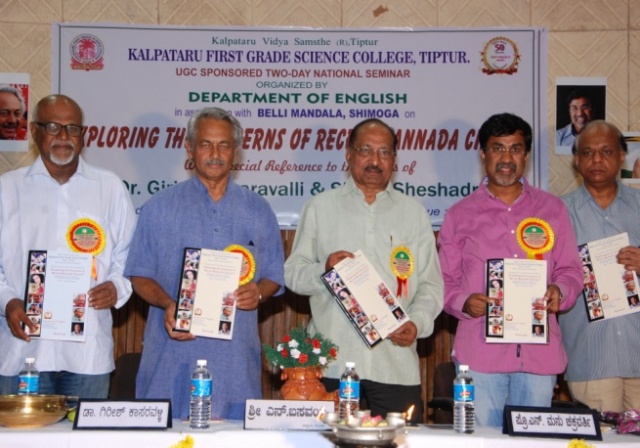
National Seminar on “Constructing Womanhood in
Kannada and Hindi Films”
• T S Nagabharana, Renowned director
• Dr Krishna Manavalli, Professor of English,
writer, translator, Gangothri, Mysore.
• B S Lingadevaru, Famous film director
• Ashok Kashyap, Cinematographer
• Vaidhyanathan, Convener, Belli Mandala
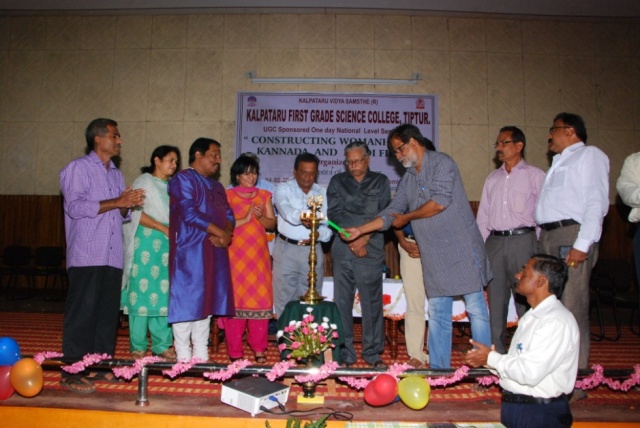
Special Lecture On “ FUN WITH ENGLISH” by Dr.
Udayaravi Shastry
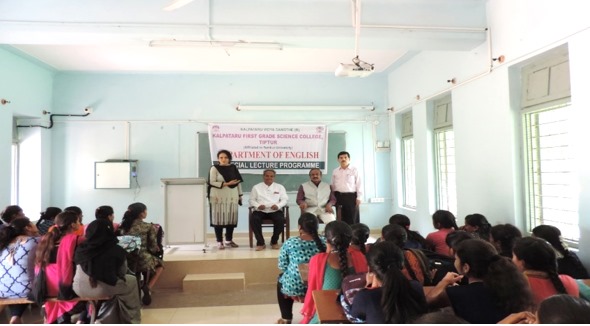
He spoke on Fun With English on 17-01-2020. He
introduced the students to English through fun
games, word games, doublet, and hangman and said
that most learning occurs only when the
atmosphere is informal, congenial and friendly.
Learning should be a pleasant experience in
life.
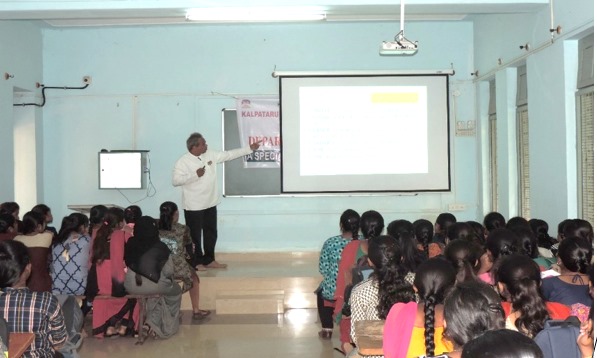
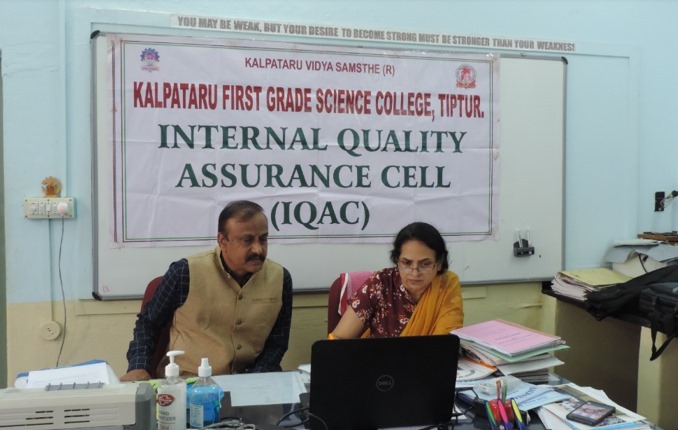
Prof. B.C. Vinutha was invited as a Resource
Personat Govt First Grade Science College,
Banavara
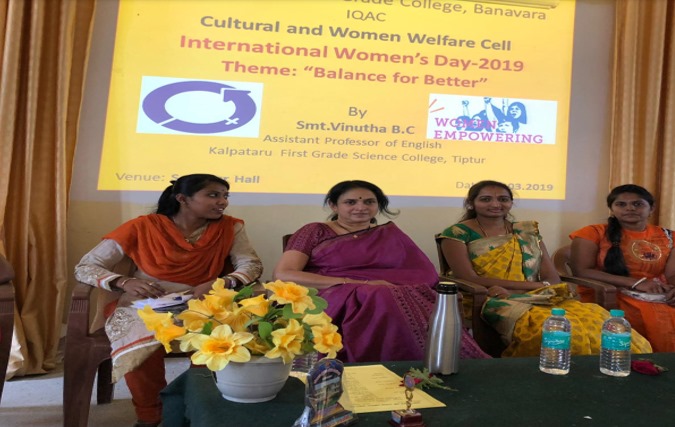
Lakshmeesha Tolpadi is a scholar, thinker,
and author with several books to his credit and
videos on YouTube.
Lakshmeesha Tolpadi spoke on social reformer
Basavanna, who preached a new way of life where
the religious experience is the centre of life
regardless of class, caste, gender, tradition or
social status. Kannada became the language of
expression, and he further said vachana is a
promise to society for a better life. Work is
worship and practice what you speak, sang the
poets. Vachanas are composed of simple words and
advocate philosophical and reformist ideas. They
advocated social justice and equality. The
verses provoked listeners to rethink racism,
gender, caste, and class discrimination
entrenched in society.


A programme on Eco-friendly Practices



Following
webinars were organized in the College in
association with IQAC, the Department of
English, the Career Guidance Cell and the Women
Redressal Cell :
-
17-06-2021
IQAC and Career Guidance Cell organized a
webinar on 'Need for Good Communication
Skills.' Srimathi S., Prof of English,
Sadvidya PU College, Mysore, was the
resource Person.
Report:
Sreemathi said Communication is
essential for life. It is vital for a
successful career. Clarity, brevity, voice
modulation, knowing the audience, listening,
knowing when to speak and when to wait, and
conveying the message effectively and
appropriately are some points discussed in
the webinar.
-
18-06-2021
The English Department and IQAC organized a
webinar on Basic English Communication in
Daily Simple Experiences.' Anjali Prayag, a
Content Strategist, was the resource person.
Report:
Anjali spoke on rules of good
communication, common negative beliefs, tips
to speak better English, Mall conversations,
telephone conversations, conversations at
the ticket counter, etc. She also shared
weekly tips like talking to vendors and
shopkeepers, reading a story or newspaper,
speaking to a child in the neighbourhood in
English, and practising in front of the
mirror.
-
23-06-2021
Career & Counselling Cell and IQAC
organized a webinar on 'Attributes required
for civil servants. ' Kalpana Rao,
Independent Director with Capgemini, was the
resource person.
Report:
Kalpana said hard work, commitment,
empathy, resilience in approach and
integrity were important for civil servants.
She further noted that being sensitive to
culture and their problems, aspirations, and
hopes is essential to connect with them.
Being value-driven, engaging people, and
being objective is vital. A civil servant
should not be careless or complacent, and
she quoted Ruskin Bond saying that one
should not take away other people's dreams,
happiness, song or faith. With freedom comes
responsibility, she said.
-
1-12-2020
IQAC and Career Counselling Cell organized a
webinar on 'Interview Skills.'
Mrs Vijayashree Urs, Director, Online
Engineer IDC Pvt Ltd, was the resource
person.
-
08-01-2021
Department of English and IQAC organized a
webinar on 'A gendered look at the impact of
the Covid-19 pandemic on women in India'.
Dr Vidya Maria Joseph, RUSA& NAAC
Coordinator, Regional Joint Director's
Office, Shivamogga, was the resource person.
Report:
Vidya spoke on the biggest calamity of
the century and the greatest challenge the
world faced and is still facing. She said
the global economy ended, jobs were laid
off, business halted, and colleges and
schools were shut down. Suddenly, we were
facing enormous health, economic and social
challenges. Loss of life played havoc in the
lives of people. Many people were at risk of
losing their livelihoods: no work, no money,
no food, and no healthcare. There was a
threat, and there was a risk. People
experiencing poverty -the women were victims
of every conceivable power and could not
feed their babies. Child marriages were on
the rise. Domestic violence and sexual
harassment became common. Many female
students suffered at home. They could not
listen to online classes but had to work in
the kitchen and on farms. They missed midday
meals, and many were married off due to
poverty. She said two distinct and dangerous
evils lay at the base of this pyramid of
suffering and degradation. The first one is
plain selfishness, and the second one is
arrogance. She concluded that a healthy
sense of selfhood and self-purification
might be the cure to enrich society and the
world. And healing should begin.
The following
short films were screened:
Short Films and Documentaries:
Films will help students interpret visual texts
and appreciate the beauty of the cinematic
language that tells some of our most powerful
cultural stories. It allows students to develop
and enjoy the film as an art and entertainment
form. Some films inform and inspire change by
engaging audiences and reflecting on society.
Some films help foster positive change and unite
people in shared responsibility for community
well-being. It shapes our beliefs and values.
They make us think. Movies share life, stories,
or experiences, inspire us to help others, and
remind us that love, compassion, and humanness
are important and worth fighting. Students
examine film and other visual media as a vehicle
for ethical, political, social, and cultural
values. The following short
films/songs/advertisements were screened:
A Chairy Tale, Anala, The Red Balloon, The Two,
Inja, Start with the Boys, Lunch Date, Fair,
Lovely Advertisement, and Karupputhan Enakku
Pidicha colouru.

Folklorist Naadamani Nalkur addresses the
audience on modern-day issues through his songs.

Inauguration and opening of Montessori Training
Centre in Kalpataru Vidys Samsthe.

Chief guest for the International Women’s Day in
PAAC College, Tiptur

Resource person for “Induction program “Topic
-Personality Development organized by Kalpataru
Institute of Technology, Tiptur.

Resource person for “International Women’s Day”
Topic: Gender equality conducted by Government
Poly-Technical College, Turvekere.

A special lecture on “Women’s Issues and Gender
Discrimination.” in Government First Grade
College, Banavara, Arsikere Taluk.

Resource Person for Induction Program Topic-
Stereotyping of Men and Women in Movies and
Advertisements.

Delivered a lecture on ‘Social Construction’ at
kalpataru Central School, Tiptur.

Resource person for “International Women’s Day”
conducted by Vedavathi First Grade College,
Hirihur.

Resource person for “International Women’s Day”
organized by PAAC college.

Guest Speaker on International Women’s Day
organized by College of Agriculture, Hassan.

Anti-ragging Cell
Anti-ragging cell includes the Management,
Principal and Heads of the Departments. Ragging
is not only discouraged but also dealt with
sternness. Students being ragged can register
their complaint to the cell without disclosing
their names and the identity of informants of
ragging incidents is fully protected. Effective
action is taken by the Principal and the members
of the cell.
Full awareness about anti-ragging act is
fostered in students by counseling from
experienced faculty so that the students have
greater awareness about the act which states
that students involved in ragging would not only
be expelled but also ineligible for admission to
any other institution for three years and can be
jailed and fined.
No incident of Ragging has been reported in the
college till date.

 |

















































 Kalpataru
Vidya Samsthe is one of the premier educational
trusts doing yeoman service to the rural people
with its various educational institutions. It
was established in 1961. Being geographically
secluded from bigger cities, and having no civic
amenities during the early 1960’s, Tiptur was
deprived of institutions for higher education.
Students aspiring to pursue tertiary education,
had to inevitably leave the town and explore
Mysore or Bangalore, which was fiscally not a
viable proposition to the local poor. Their
ambition would have continued to remain a
distant dream, but for some extraordinary
visionaries.
Kalpataru
Vidya Samsthe is one of the premier educational
trusts doing yeoman service to the rural people
with its various educational institutions. It
was established in 1961. Being geographically
secluded from bigger cities, and having no civic
amenities during the early 1960’s, Tiptur was
deprived of institutions for higher education.
Students aspiring to pursue tertiary education,
had to inevitably leave the town and explore
Mysore or Bangalore, which was fiscally not a
viable proposition to the local poor. Their
ambition would have continued to remain a
distant dream, but for some extraordinary
visionaries.












